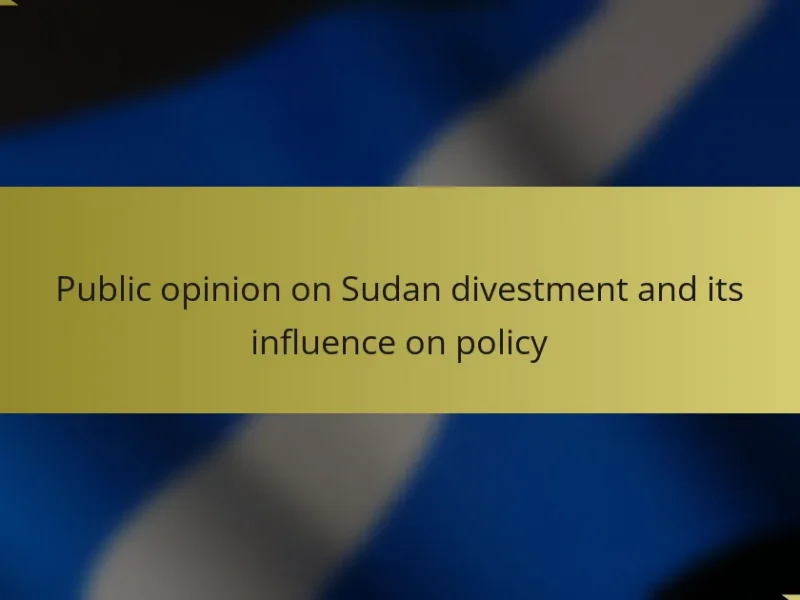Sudan divestment involves the withdrawal of investments from companies operating in Sudan, primarily due to concerns over human rights violations and ongoing conflicts. This action aims to pressure the Sudanese government to reform its policies by reducing financial support, thereby promoting ethical business practices. The article examines the negative effects of Sudan divestment on foreign investment, highlighting how it signals political instability and diminishes investor confidence. Additionally, it discusses strategies to mitigate these impacts, such as engaging in diplomatic dialogue, fostering economic reforms, and establishing public-private partnerships to improve the investment climate in Sudan.

What is Sudan divestment and its significance?
Sudan divestment refers to the withdrawal of investments from companies and entities operating in Sudan. This action is often taken in response to human rights violations and conflicts within the country. The significance of Sudan divestment lies in its potential to pressure the Sudanese government to change its policies. By reducing financial support, divestment aims to promote ethical business practices and human rights. Various organizations, including the U.S. government, have implemented divestment policies targeting Sudan. These efforts have been linked to raising awareness about the situation in Sudan and influencing international relations. Studies have shown that divestment can impact a country’s economy by limiting foreign investment opportunities.
How does Sudan divestment impact the local economy?
Sudan divestment negatively impacts the local economy. It leads to reduced foreign investment, which is crucial for economic growth. The withdrawal of international companies decreases job opportunities for local workers. This results in higher unemployment rates and lower household incomes. Additionally, divestment can reduce government revenue from taxes and royalties. Consequently, public services may suffer due to budget constraints. Economic instability may also arise from reduced investor confidence. Overall, divestment creates a cycle of economic decline that affects various sectors in Sudan.
What are the immediate effects of divestment on Sudan’s financial stability?
Divestment has immediate negative effects on Sudan’s financial stability. It leads to decreased foreign investment and capital flight. Investors often withdraw funds due to perceived risks. This withdrawal results in reduced liquidity in the financial markets. Consequently, the Sudanese currency may face depreciation. A weaker currency increases inflationary pressures. Additionally, divestment can hinder access to international financial systems. This limits Sudan’s ability to engage in trade and secure loans. Overall, divestment destabilizes Sudan’s economic environment significantly.
How does divestment influence employment rates in Sudan?
Divestment negatively influences employment rates in Sudan. When foreign companies withdraw their investments, job opportunities decrease. Many sectors, including oil and agriculture, suffer from reduced funding. This leads to layoffs and higher unemployment rates. For instance, the withdrawal of major oil companies in the early 2000s resulted in thousands of job losses. Consequently, local businesses also struggle due to decreased economic activity. Overall, divestment creates a challenging environment for employment growth in Sudan.
What are the historical contexts of Sudan divestment?
Sudan divestment refers to the withdrawal of investments from Sudan by various entities due to political and humanitarian concerns. The historical context includes the Second Sudanese Civil War, which lasted from 1983 to 2005, resulting in significant human rights violations. In 2004, the U.S. government declared the situation in Darfur a genocide, prompting increased divestment actions.
Many universities and pension funds began divesting from companies operating in Sudan, especially those involved in oil production. The Sudan Accountability and Divestment Act was enacted in 2007, encouraging further divestment from companies that contributed to the violence.
By 2011, South Sudan gained independence, but issues remained regarding governance and human rights in Sudan. Continued divestment efforts were aimed at pressuring the Sudanese government to improve its human rights record. The historical context shows a pattern of divestment as a form of economic and political leverage against Sudan’s government.
What events led to the current state of divestment in Sudan?
The current state of divestment in Sudan is primarily due to ongoing conflict and human rights violations. The Darfur conflict, which began in 2003, sparked international condemnation and economic sanctions. In 2019, the ousting of President Omar al-Bashir led to hopes for reform but was followed by military control. The military’s violent crackdown on protests further alienated foreign investors. Additionally, the economic crisis and inflation have made Sudan less attractive for investment. International organizations have called for divestment due to the government’s actions against civilians. These events cumulatively contributed to the current state of divestment in Sudan.
How have international relations shaped Sudan’s divestment landscape?
International relations have significantly influenced Sudan’s divestment landscape. The imposition of economic sanctions by the United States in the 1990s led to reduced foreign investment. This created a challenging environment for Sudan’s economy. Additionally, diplomatic relations with Western countries have historically affected Sudan’s ability to attract investors. The 2011 secession of South Sudan further complicated these dynamics. This event resulted in the loss of oil revenue, impacting foreign interest. Recent efforts to normalize relations with the international community have aimed to reverse divestment trends. The lifting of sanctions in 2017 marked a pivotal moment for potential foreign investment. Overall, international relations remain a crucial factor in shaping Sudan’s divestment landscape.

How does Sudan divestment affect foreign investment?
Sudan divestment negatively impacts foreign investment. Divestment often signals political instability and economic uncertainty. This perception leads to decreased investor confidence. Consequently, foreign companies may withdraw or avoid investment in Sudan. For example, following the U.S. sanctions in the early 2000s, many investors exited the Sudanese market. The lack of foreign investment hampers economic growth and development. Additionally, divestment can result in reduced access to international financing. This further isolates Sudan from global economic opportunities.
What are the direct consequences of divestment on foreign investors?
Divestment directly impacts foreign investors by reducing their market access and potential returns. When a country undergoes divestment, foreign investors may face increased risks. This includes instability in the investment climate and potential loss of assets. For example, divestment can lead to unfavorable regulatory changes. Foreign investors may also experience reputational risks associated with divesting from certain regions. Additionally, divestment can trigger capital flight, leading to decreased foreign direct investment. Historical instances show that divestment often results in diminished economic partnerships. Consequently, foreign investors might seek alternative markets with more stable conditions.
How do investors perceive the risks associated with divestment in Sudan?
Investors perceive the risks associated with divestment in Sudan as significant and multifaceted. Political instability in Sudan raises concerns about the safety of investments. Additionally, economic sanctions can lead to reduced market access and profitability. The lack of transparency in the business environment further exacerbates investor apprehension. Furthermore, human rights issues in the region may lead to reputational risks for companies. Investors often assess these factors when deciding to divest or remain invested. The cumulative effect of these risks can deter foreign investment significantly.
What sectors are most affected by reduced foreign investment due to divestment?
The sectors most affected by reduced foreign investment due to divestment in Sudan include oil and gas, telecommunications, and agriculture. Oil and gas have historically attracted significant foreign capital, but divestment leads to diminished exploration and production activities. Telecommunications suffer as foreign companies withdraw, resulting in reduced infrastructure development and service quality. Agriculture faces challenges due to decreased investment in technology and export capacity. These sectors are crucial for Sudan’s economy, and their decline impacts overall economic stability.
Why do foreign investors withdraw from Sudan?
Foreign investors withdraw from Sudan primarily due to political instability and economic challenges. The ongoing conflict and lack of a stable government create an unpredictable investment environment. Investors face risks such as asset expropriation and regulatory changes. Additionally, Sudan’s economic sanctions limit access to international markets. Poor infrastructure and corruption further deter investment. Reports indicate that these factors have led to significant capital flight. In 2021, foreign direct investment in Sudan dropped by over 30%. This trend reflects growing concerns among investors about the long-term viability of their investments in the country.
What role do political instability and sanctions play in investor decisions?
Political instability and sanctions significantly deter investor decisions. Investors seek stable environments for their capital. Political turmoil increases risks, leading to uncertainty in returns. Sanctions restrict market access and operational capabilities. For instance, the U.S. sanctions on Sudan limited foreign investments. Such measures create a perception of high risk. Consequently, investors often withdraw or avoid entering unstable markets. Historical data shows that countries with political instability experience decreased foreign direct investment.
How does the perception of risk affect foreign direct investment in Sudan?
The perception of risk significantly impacts foreign direct investment (FDI) in Sudan. High perceived risks, such as political instability and economic uncertainty, deter potential investors. Investors often analyze the risk environment before committing capital. A negative perception can lead to reduced FDI inflows. For instance, ongoing conflicts and sanctions have historically limited investment opportunities in Sudan. According to the World Bank, FDI in Sudan decreased by 50% during periods of heightened political turmoil. This illustrates how risk perception directly correlates with investment decisions. Investors seek stable environments to minimize potential losses. Therefore, improving the perception of risk is crucial for attracting FDI in Sudan.

What strategies can be employed to mitigate the effects of Sudan divestment on foreign investment?
Engaging in diplomatic dialogue can mitigate the effects of Sudan divestment on foreign investment. Establishing partnerships with international organizations can enhance credibility. Promoting economic reforms can attract foreign investors by improving the business climate. Offering incentives, such as tax breaks, can encourage investment despite divestment pressures. Strengthening local governance can improve stability, making Sudan more appealing to foreign investors. Additionally, fostering public-private partnerships can leverage resources and expertise. Building a robust communication strategy can help manage perceptions and inform stakeholders about the positive changes in Sudan. These strategies collectively aim to create a more favorable investment environment amidst divestment challenges.
How can the Sudanese government attract foreign investors despite divestment trends?
The Sudanese government can attract foreign investors by implementing economic reforms and improving the investment climate. Streamlining regulatory processes can enhance transparency and efficiency. Establishing special economic zones may provide incentives for foreign businesses. Strengthening legal protections for foreign investments can build trust. Additionally, promoting sectors like agriculture and renewable energy can showcase growth potential. Engaging in international partnerships can also enhance credibility. According to the World Bank, countries with favorable investment climates see increased foreign direct investment.
What policies can be implemented to improve the investment climate in Sudan?
Implementing policies to improve the investment climate in Sudan includes enhancing regulatory frameworks and ensuring political stability. Streamlining business registration processes can attract more investors. Establishing clear property rights will protect investments. Offering tax incentives can make Sudan more attractive for foreign businesses. Improving infrastructure, such as transportation and energy, supports economic activities. Strengthening anti-corruption measures builds investor confidence. Engaging in public-private partnerships can drive development projects. Finally, fostering a skilled workforce through education and training initiatives is essential for sustainable growth.
How can partnerships with international organizations support foreign investment?
Partnerships with international organizations can enhance foreign investment by providing credibility and stability. These partnerships often lead to improved regulatory frameworks. They can also facilitate access to funding and resources. Furthermore, international organizations can offer technical assistance and training. This support helps local businesses become more competitive. Enhanced competitiveness attracts foreign investors looking for viable opportunities. Historical examples show that countries with strong international ties see increased investment flows. For instance, nations engaging with the World Bank often experience economic growth and investor confidence.
What best practices can foreign investors adopt when considering investments in Sudan?
Foreign investors should conduct thorough due diligence before investing in Sudan. This includes understanding the legal framework and regulatory environment. Investors should familiarize themselves with the local market dynamics. Engaging with local partners can enhance market entry and risk management.
Investors must assess the political climate and stability of the region. Monitoring geopolitical developments is crucial, as they can impact investment security. Foreign investors should also consider the economic conditions, including inflation and currency fluctuations.
Establishing a strong network with local businesses and government can facilitate smoother operations. Investors should also be aware of potential divestment risks and strategies to mitigate them. Understanding cultural nuances can improve business relationships and operations in Sudan.
What risk management strategies should investors consider in the context of Sudan?
Investors in Sudan should consider diversifying their investment portfolio to mitigate risks. Diversification reduces exposure to any single asset or sector. Investors should also conduct thorough due diligence before entering the market. Understanding local laws and regulations is crucial for compliance.
Establishing partnerships with local firms can provide valuable insights and reduce operational risks. Investors should also consider political risk insurance to protect against government actions. Monitoring the geopolitical landscape is important for timely decision-making.
Finally, maintaining liquidity can help investors respond quickly to market changes. These strategies are essential for navigating the complexities of investing in Sudan.
How can investors leverage local knowledge to navigate the Sudanese market effectively?
Investors can leverage local knowledge by partnering with Sudanese businesses and experts. This collaboration provides insights into market trends and consumer behavior. Understanding cultural nuances can enhance marketing strategies. Local knowledge helps identify regulatory challenges and opportunities. Investors can navigate the complex political landscape more effectively through local connections. Engaging with community leaders builds trust and credibility. Utilizing local networks aids in resource acquisition and distribution. Research indicates that companies with local partnerships see higher success rates in emerging markets.
Sudan divestment refers to the withdrawal of investments from entities operating in Sudan, primarily driven by concerns over human rights violations and political instability. This article explores the significance of Sudan divestment, its impact on the local economy, and how it influences foreign investment. Key topics include the historical context of divestment, immediate effects on financial stability and employment rates, and the role of international relations. Additionally, strategies for mitigating the adverse effects of divestment on foreign investment and best practices for investors navigating the Sudanese market are discussed.


